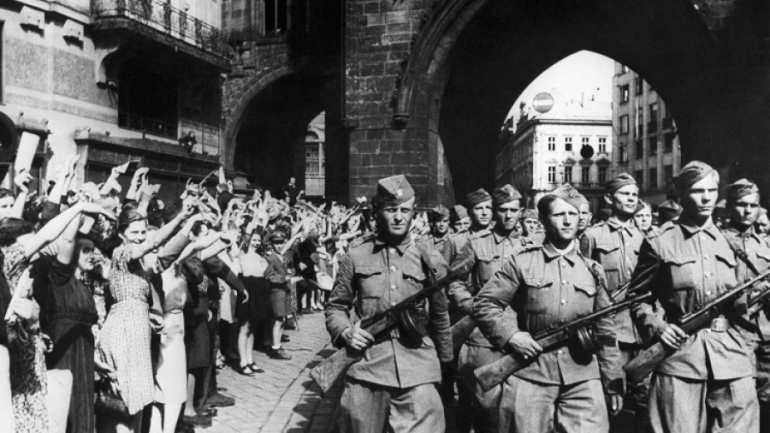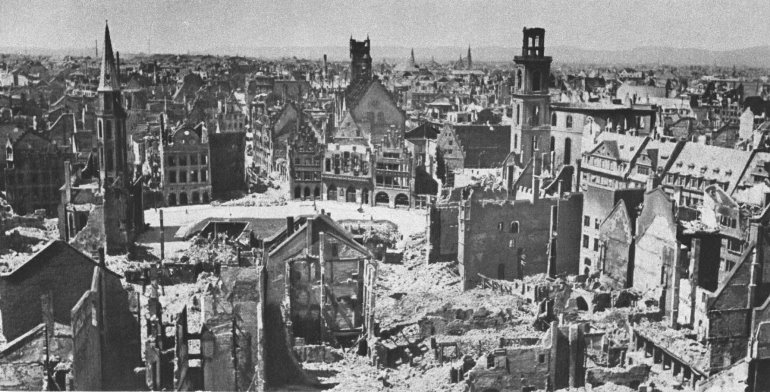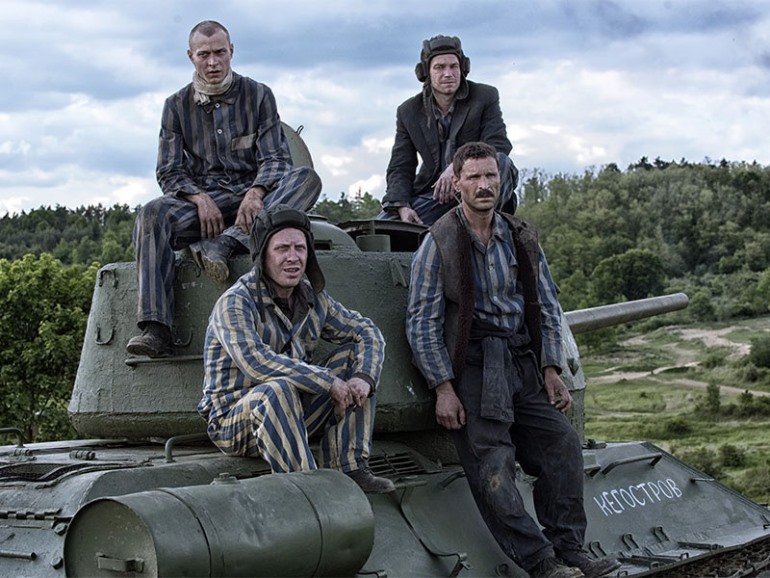Photo credit: may9.ru
Editorial office of Russkiy Mir Portal
On January 17, the first meeting of the working group of the Russian Historical Society (RHS) took place under the chairmanship of Sergey Naryshkin. It was dedicated to arrangements for the 75th anniversary of the liberation of Eastern Europe from fascism.
More than 100 million people
Opening the meeting, the Chairman of the Russian Historical Society Sergey Naryshkin recalled the words of the English writer Bernard Shaw, which he had said in the early days of the Great Patriotic War: "When Russia crushes Hitler, it will become the spiritual center of the world." The outcomes of the Russian arms victory over the fascist invaders are impressive in their globality. As Naryshkin emphasized, the territories of nine countries of Eastern and Northern Europe were partially or fully liberated by Soviet units — over a hundred million people got rid of the Nazi oppression for good.
He also mentioned that from the first days of the war, the leadership of the Soviet Union had actively supported development of liberation movements in the countries of Eastern Europe and provided weapons for their partisan detachments. Polish and Czechoslovak active armed forces were formed in the Soviet rear, and later they took part in liberation of their countries.
At the same time, Red Army soldiers, who were captured as prisoners of war and put to Nazi camps in Europe, often became leaders of antifascist resistance. “It is enough to recall the feat of Alexander Pechersky, who raised the famous revolt of the Sobibor prisoners in Poland. Or remember heroes of the Motherland partisan detachment that operated in France,” said Sergey Naryshkin
Resistance of fascists in Poland, Hungary, Czechoslovakia, and Romania was simply desperate. The Wehrmacht concentrated 75% of all heavy weapons and almost five million soldiers and officers to fight against the advancing units of the Red Army. Even opening of the second front in spring of 1944 did not induce the Nazis to transfer there any significant resources.
“The fascists, fearing retaliation, turned beautiful cities into fortresses, destroying everything in their path of retreat. Soviet intelligence officers played critical role in preservation of cultural valuables. Alexey Botyan, the legendary Major Vihr’, who had saved one of the most beautiful cities in Europe, Krakow, from destruction and explosion planned by the Nazis, left good memory of himself in Poland,” recalled the head of the RHS.
The Order of Marshal Konev
According to him, arrival of the Red Army in these countries restored one of the fundamental human rights - the right to life. Liberating the territory of Poland, the Soviet troops liquidated the largest death camps there: Majdanek, Treblinka, Auschwitz, where the Nazis killed in cold blood over six million people.
In his turn, the Minister of Culture Vladimir Medinsky believes it is necessary to destroy Western myths regarding our country’s contribution and contribution of the allies into the Victory in general. He recalled that Marshal Konev by his order had prohibited use of heavy and medium artillery during European cities' capture, including Krakow. On the other hand the British and American aviation erased the most beautiful cities in Europe one by one - Dresden, Rotterdam, Frankfurt.
Vladimir Medinsky spoke about his recent trip to Frankfurt. He saw the Frankfurt in Spring of 1945 photo exhibition held in the central Cathedral. It was clearly shown on the photographs that this cathedral had been the only undestroyed building in the whole city. “There was one building surrounded by ruins as far as the eye could reach. Such extensive bomb attacks had no military significance. There were no military manufactures or military forces. It was purely discouraging. Perhaps it was the Red Army that they wanted to discourage by showing modern technologies of total clearing operation from the air,” the Minister said.
Frankfurt on the Main, 1945. Photo credit: travel.drom.ru
He underlined that our troops had preserved cultural values. And the quintessential example was preservation of valuable items of the Old Masters Gallery in Dresden. The paintings were in the waterlogged rock quarries and were mine studded. At first, the paintings were saved from destruction by Soviet combat engineers, and then conservation professional restored more than 1,500 paintings in the USSR before they were returned to the GDR.
Particular attention he gave to help of allies. “No one can deny heroism of soldiers and officers of the Allied army, however let me remind you of a few figures. There were 50 to 60 divisions on the western front and 235 divisions on the eastern one. Another figure to remember is losses suffered by Germany on the eastern and western fronts. Before the second front was opened, German troops incurred 93% of losses on the eastern front. After it was opened, the ratio became 20 to 80, which means the main part of the losses were still accounted for the eastern direction,” Medinsky emphasized.
The rector of the Moscow State Institute of International Relations of the Ministry of Foreign Affairs of the Russian Federation, Anatoly Torkunov, noted that our army had suffered the most significant losses in Poland and Hungary, where about 600 thousand and 140 thousand Red Army soldiers were killed respectively.
He also added that the Soviet army had cooperated with partisan movement throughout Central and Eastern Europe. “Activities of Yugoslav Partisans would hardly have been so effective without help of the Soviet Union. We know that today people in many countries of the former Yugoslavia feel great piety to assistance of the Soviet army,” the MGIMO Rector said.
"There should be more of such films"
The Chairman of the Federation Council’s International Affairs Committee, Konstantin Kosachev, anticipated that Russia would have to face the system-related opposition to our interpretation of the respective events from a number of countries. In his opinion, it is very important to ensure Russia’s presence at the commemorative events at the highest possible, as well as political, public and scientific levels. In particular, soon, on January 27, the International Holocaust Remembrance Day will be commemorated. Memorial events will be held in Auschwitz, Poland, where the Auschwitz concentration camp was located. Although relations between the Federation Council and members of Polish parliament have been put on hold, the senators intend to send a delegation to the Auschwitz event. “We are not going to the Polish, but to Auschwitz, which is a landmark of our Victory,” emphasized Kosachev.
In this regard, Vladimir Medinsky recalled Sobibor, a Russian war drama film released in 2018. Previously they tried to avoid this particular topic since they were reluctant to mention that the camp had been guarded by Ukrainian nationalists. The Minister of Culture believes that there should be more of such films. He used as example T-34, an extremely successful Russian motion picture, which collected more than one billion rubles in just one week after its release.
A screennshot from Т-34 feature. Photo credit: allbel.info
For those critics who blame the filmmakers for the happy end, which was not the case in reality, Medinsky replied with example of Saving Private Ryan, an American war film, “The history has never seen such fact as the one shown in Saving Private Ryan: American landing teams were sent to save one soldier. However, the film is excellent.”
Summarizing results of the meeting, there was the task force established. It will develop activities and events for the 75th anniversary of the liberation of Eastern Europe from fascism and will be supervised by Anatoly Torkunov.










